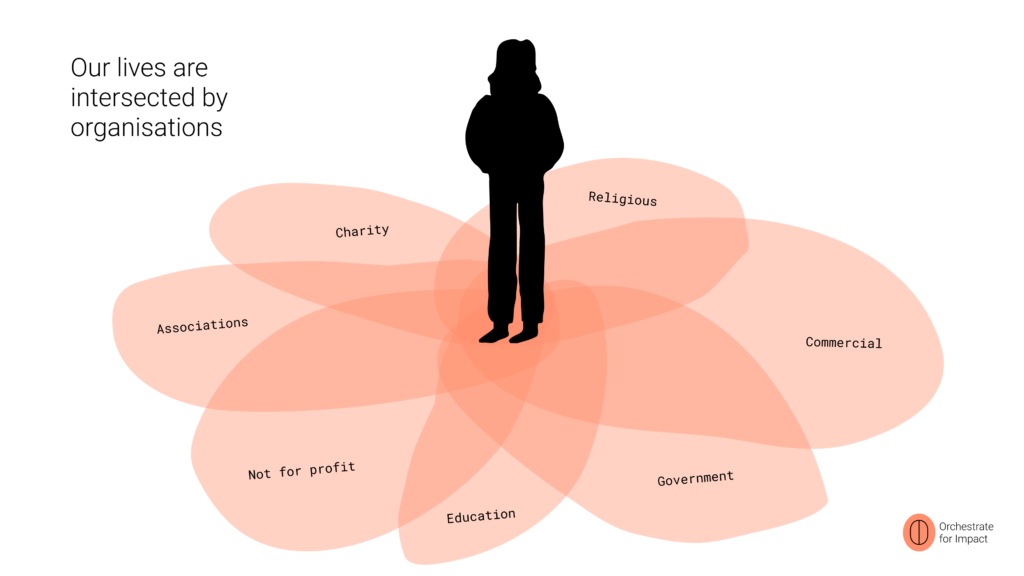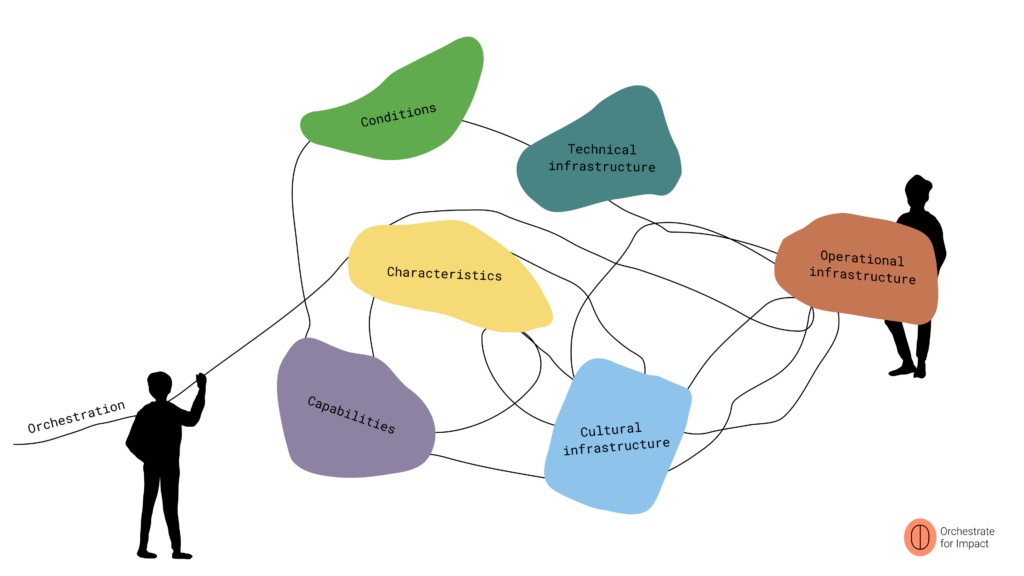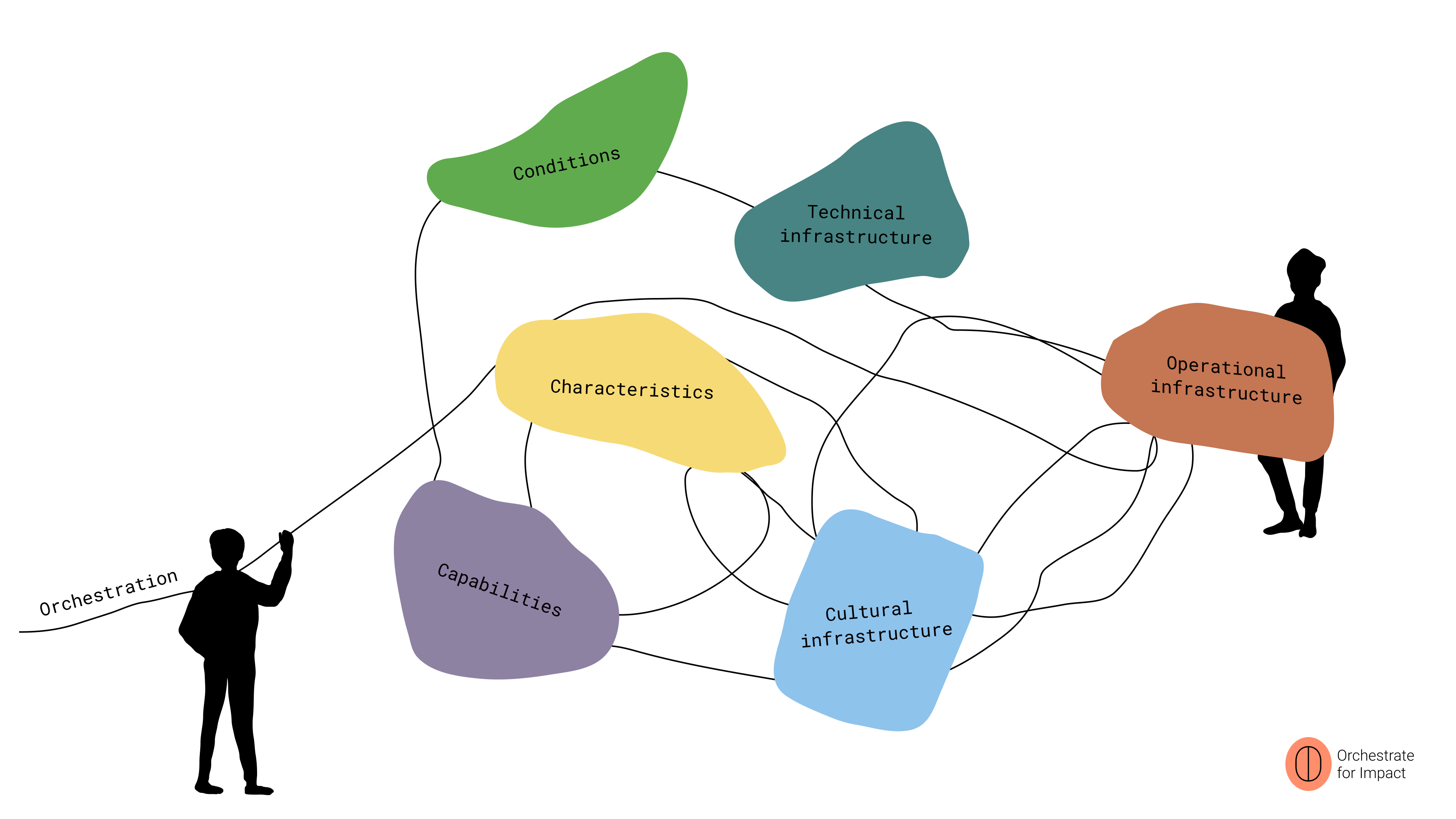Day in and day out, our planet, our societies, and our individual lives are directly and indirectly impacted by organisations.
At its simplest, an organisation is a collective of people & capacities that comes together for a purpose. Large or small, for-profit, non- or for-public, there are the obvious organisations that loom large in our lives, and others you have no direct visibility of.
Look around you, it’s easy to take quick stock. Our individual life is but a snapshot, fully intersected with the influence and impact organisations have.
- The electric company made choices about how your electricity is generated and brought to your home
- Employees were underpaid when making the TV in your living room
- Your doctor’s office isn’t going to be able to fit you in today short notice, but you don’t know it yet because their systems aren’t integrated
- The cushion on your chair is made up of 50% recycled materials because the furniture company has made a circularity commitment in its manufacturing process
- That tax bill sitting on the table is thanks to governmental structures and legislation that your representatives voted for or against (if you were able to have a say at all)
The list goes on, at all scales from the simple to the complex. Every organisation is functioning in ways, large and small, that either contributes towards or away from a better tomorrow. Is the impact known? Is the desired contribution and impact driving decisions? Many of us can say, by experience and observation, that the answer is likely ‘no’.

Orchestration is a cross-organisational imperative
It’s not because we aren’t trying. The aspiration is there, and we see it reflected everyday in organisational values, strategies and agendas. Whether complicated or complex, often these intentions struggle to be translated into reality. The challenge is often that we don’t really understand HOW to best orchestrate across an organisation to bring that potential future to life, nor the full spectrum of WHAT organisational elements are needed in the first place.
Things like…
HOW do we support our local economies and grow local businesses in how we procure?WHAT needs to be in place for social procurement to be the heart of how we purchase and partner?
HOW do we more effectively deliver service to the people we serve?
WHAT needs to be in place to have an integrated, for-purpose service model that meets the needs of the people we serve?
HOW do we contribute to our regional circularity goals? WHAT needs to be in place for our manufacturing to actually be circular?
HOW do we ensure we are protecting the privacy and data of our citizens? WHAT needs to be in place for cyber security to be embedded in how our organisation functions day to day?
These are all examples of things that impact the entirety of an organisation and therefore require many things to be true and in place. Unfortunately, we often see organisations miss critical aspects needed to actually get to the desired outcomes. If you’ve been in the land of work, you will have experienced these aspirations and the challenge of ‘almost’ getting there. A new system will be put in without shifting ways of working; cultural training without embedding learnings; financial delegations without changing bureaucracy. We are missing critical organisational elements to the success equation, and we’re not orchestrating as well as we could across the organisation for there to be true impact, small or large.
Organisations need to orchestrate for impact on purpose

Orchestrating for impact is an intentional act. It is understanding the organisational elements needed and orchestrating them in particular ways to get to an outcome. It is done deliberately. It is done on purpose.
We need to broaden our view of what organisational elements are needed for true impact, like conditions, characteristics, capabilities and infrastructure in every sense of the word (technical, cultural and operational).
Each word of Orchestrate for Impact holds a depth for us to explore and create shared understanding around.
ORCHESTRATE
Bringing together the necessary elements, in effective ways, at the right times, for the right duration, at the right scale.
- What are the elements and combinations of elements we should be fostering and establishing in organisations today to shape better futures?
- How do we foster, establish and maintain those elements?
- What are the ways of orchestrating these elements within complex organisations?
FOR
With purpose and intention, in service of and contribution towards
- How do we orchestrate intentionally towards particular outcomes and impact?
- How do we foster the will to be intentional within organisations?
IMPACT
Directionally intended, positively shifting & contributing. Signals, measures & anecdotes towards a better future.
- What kinds of impact could organisations have if the right elements were in place and orchestrated well?
- What scale is the impact? How direct or indirect is the contribution?
- What signals give us a sense that the individual elements, combinations or orchestration are directionally correct?
We need to stop hoping our organisations have impact and start actively understanding what it takes to make it true.
Let’s prepare our organisations today to shape a better tomorrow
Let’s actually get to where we want to go. We can do this by understanding what elements are or not currently in place. We can take deliberate action to establish and strengthen the elements needed. We do this by seeing organisations as dynamic and systemic objects of design.
We can make sure our organisations are doing their part to shape a better tomorrow by understanding the role organisations play in directly and indirectly addressing complex economic, social and environmental challenges. We need to know what outcomes and impacts organisations could, should and must be contributing towards.
Setting our organisations up to be flexible, adaptable, and proactive to the ever-changing landscape is foundational and builds confidence that our ecosystem of organisations is playing a more positive part in our collective future.
Calling fellow orchestrators! Are you someone responsible for orchestrating for impact? Welcome! Follow & chat! Let’s connect!
Let’s create new ways of understanding and orchestrating organisations.
Let’s celebrate the stories of orchestrators finding success and impact in their organisations.
Let’s understand the organisational elements needed to get to the impacts we aspire for.
Let’s believe that organisations can be a positive force for a better tomorrow.

